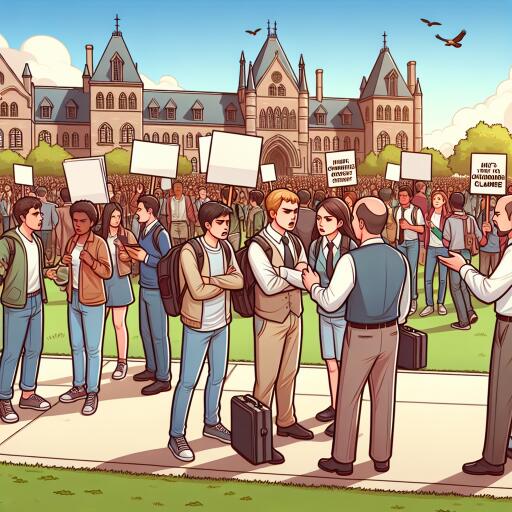An Unfolding Conflict: Pro-Palestinian Group Sues Columbia University Amid Campus Protests
In a bold legal move, a pro-Palestinian organization has taken Columbia University to court, alleging that its pro-Palestinian activists, rather than being perpetrators of hostility, are in fact the aggrieved parties amidst escalating tensions on campus. This lawsuit surfaces against a backdrop of intensified campus demonstrations, where vocal anti-Israel sentiments have been met with significant opposition, contributing to a charged atmosphere at this prestigious Ivy League institution.
With the campus environment becoming increasingly polarized, concerns over safety have prompted the university’s administration to permit remote learning alternatives for the remainder of the academic term. This decision underscores the extent of the unrest and the challenges in managing campus harmony and student well-being.
Represented by Palestine Legal, the lawsuit was lodged with the U.S. Department of Education’s Office for Civil Rights. This legal action calls for a thorough investigation into what the group asserts are instances of discrimination and harassment directed at pro-Palestinian students by others within the Columbia community, including faculty and administrative figures. The accusations pivot around potential violations under Title VI of the Civil Rights Act of 1964, a cornerstone of civil rights legislation that prohibits discrimination on the basis of race, color, or national origin in programs and activities receiving Federal financial assistance.
Central to the complaint are the experiences of four students who argue that their advocacies for Palestinian rights have made them targets of undue aggression and bigotry. “The level of harassment I’ve faced, from doxxing to being publicly maligned and subjected to disciplinary actions for my peaceful protests, illustrates a grievous failure on Columbia’s part to safeguard me and others like me,” shared one of the students involved in the lawsuit.
These students recount incidents of receiving death threats and being branded with derogatory terms, actions they attribute to an ingrained anti-Palestinian, anti-Arab, and Islamophobic sentiment within the campus. They further allege that the university’s top administrators have not addressed their grievances adequately, leading to a sense of neglect and inequality.
A pivotal contention in the lawsuit is the handling by the university of a significant campus event where, for the first time in many years, the New York Police Department was called onto campus to disband an anti-Israel demonstration, resulting in over a hundred arrests. This action, according to the lawsuit, is indicative of the university’s biased stance and its inadequate response to the concerns of pro-Palestinian students.
The continuation of the pro-Palestine protest encampment on campus, despite university-imposed deadlines for its removal, has sparked outrage among other student groups. In a parallel legal effort earlier this year, Palestine Legal teamed up with the New York City Liberties Union, challenging Columbia’s suspension of student groups involved in peaceful protests, further emphasizing the ongoing legal and social conflicts surrounding campus activism.
In response to inquiries regarding the lawsuit and the allegations it contains, Columbia University has maintained a stance of non-commentary. Similarly, requests for comments from Palestine Legal and the Department of Education at the time of writing have not been returned.
The escalating dispute at Columbia University mirrors broader national and global conversations about the Palestinian-Israeli conflict, freedom of speech, and the rights of students to safe and equal participation in academic environments. As legal proceedings progress, this lawsuit may not only address the specific allegations of discrimination and harassment at Columbia but also contribute to the wider discourse on campus activism, student rights, and academic freedom.
As the community awaits further developments, the situation at Columbia University remains a poignant reminder of the complex interplay between advocating for one’s beliefs and navigating the diverse perspectives that coexist within academic institutions.









